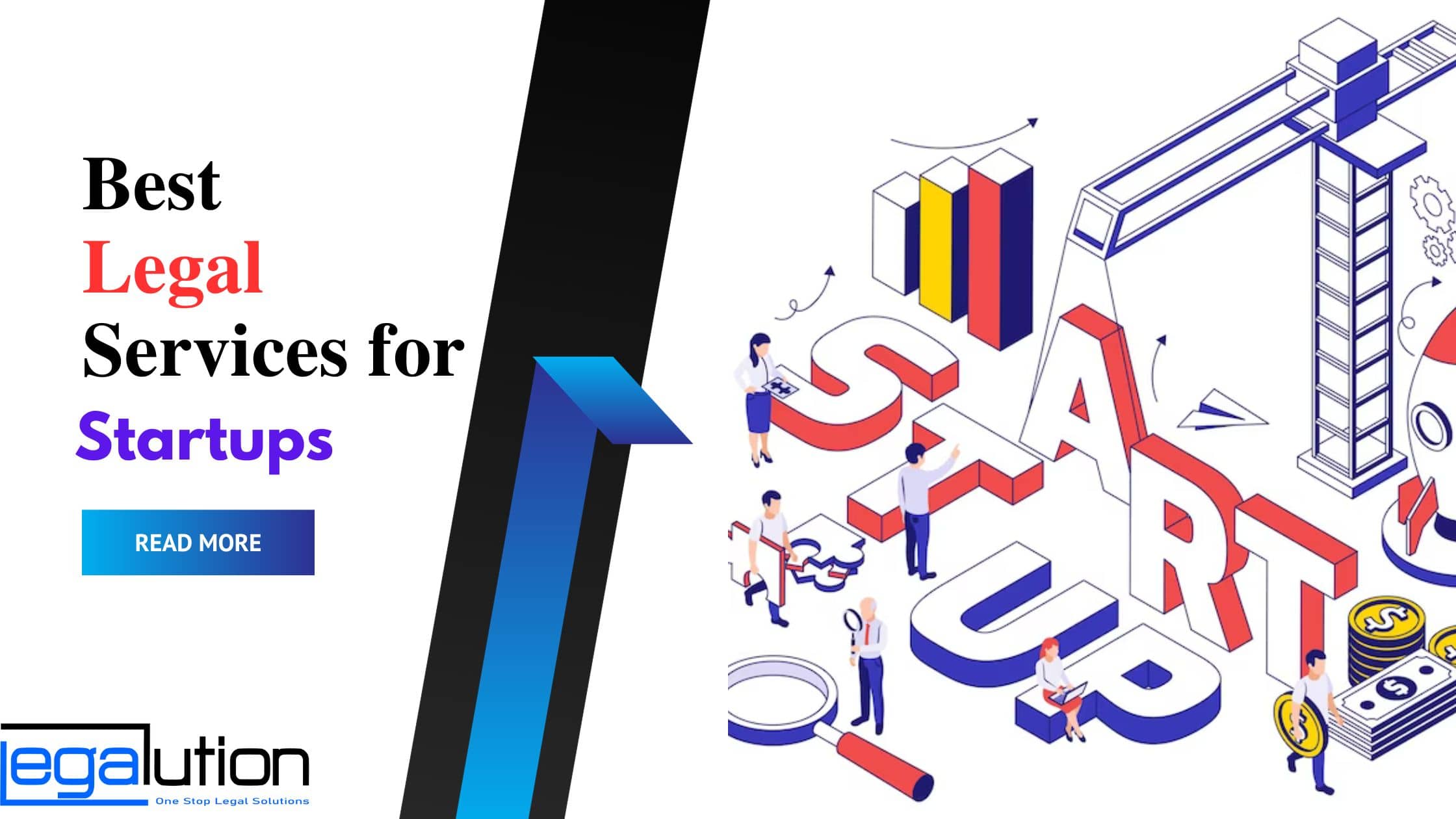
Best Legal Services for Startups: A Comprehensive Guide
Table of Contents
ToggleIntroduction
Starting a new business is exciting, but it comes with legal challenges. That’s where we step in. At Legalution, we specialize in helping startups with their legal needs. From setting up your business to protecting your ideas, we’re here to guide you.
Our team of experienced lawyers is ready to be your partners, providing simple and effective legal solutions so you can focus on growing your startup. Trust us to handle the legal stuff while you build the future of your business.
Challenges Faced Without Proper Legal Guidance
Without Proper Legal Guidance, Startups Face:
Legal Blind Spots:
Operating without legal advice can lead to overlooking critical aspects of business compliance, contracts, and regulatory requirements, creating vulnerabilities that may result in legal complications.
Intellectual Property Risks:
Inadequate protection for your innovations, trademarks, and trade secrets may expose your startup to the risk of infringement, theft, or disputes that can hinder business growth.
Contractual Ambiguities:
Drafting and negotiating contracts without legal expertise can result in unclear terms, misunderstandings, and potential disputes with partners, suppliers, or clients, jeopardizing crucial business relationships.
Regulatory Compliance Issues:
Startups often face a maze of regulations. Without proper legal guidance, navigating compliance requirements becomes challenging, leading to fines, penalties, and operational disruptions.
Employee Relations Challenges:
Handling employment matters without legal advice may result in issues related to contracts, workplace policies, and compliance with labor laws, impacting employee satisfaction and exposing the startup to legal liabilities.
Investment and Funding Risks:
Without proper legal documentation and compliance, securing investments or funding can become precarious, potentially deterring potential investors and limiting the financial growth of the startup.
Dispute Resolution Difficulties:
When disputes arise, startups without legal counsel may struggle to navigate legal processes, leading to prolonged and costly conflicts that divert focus from core business operations.
Data Security Concerns:
In an era of increasing cyber threats, startups without proper legal guidance may overlook data protection measures, putting sensitive information at risk and facing legal consequences in case of a data breach.
Purpose of the Blog: A Guide for Startups on Essential Legal Services
- Navigate Legal Challenges: Provide a roadmap for startups to understand and address legal hurdles.
- Mitigate Risks: Identify potential pitfalls and offer strategies for proactive risk management.
- Empower Decision-Making: Highlight legal considerations for informed decision-making at each growth stage.
- Ensure Compliance: Educate on industry regulations, fostering adherence to standards.
- Protect Intellectual Property: Emphasize safeguarding IP through trademarks, copyrights, and patents.
- Clarify Contracts: Guide in creating clear contracts to prevent disputes with partners, clients, and suppliers.
- Manage Employees Legally: Address legal aspects of hiring, managing, and terminating employees.
- Facilitate Funding: Equip with legal knowledge for attracting investments and securing funding.
- Promote Data Security: Outline measures to protect sensitive data and comply with regulations.
- Resolve Disputes Efficiently: Offer insights into efficient dispute resolution to minimize legal disruptions.
- Ensure Long-Term Sustainability: Advocate for integrating legal considerations into overall business strategy for sustained growth.
Choosing the Right Business Structure: A Comprehensive Overview
Explaining Different Business Structures: LLC, Corporation, Sole Proprietorship
Limited Liability Company (LLC):
- Flexible structure combining elements of partnerships and corporations.
- Offers limited liability for owners (members).
- Pass-through taxation—profits and losses flow through to the members’ personal tax returns.
Corporation:
- Independent legal entity separate from its owners (shareholders).
- Limited liability for shareholders.
- Various types, including C Corporations and S Corporations, each with distinct taxation models.
Sole Proprietorship:
- Simplest form with a single owner.
- Owner has unlimited liability, personally responsible for business debts.
- Pass-through taxation—business income reported on the owner’s personal tax return
Pros and Cons of Each Structure for Startups
LLC(Limited Liability Company )
Pros
- Limited liability protects personal assets.
- Flexible management structure.
- Pass-through taxation simplifies tax reporting.
Cons:
- Limited fundraising options.
- Potential for increased self-employment taxes.
Corporation
Pros:
- Strong liability protection for shareholders.
- Easier to attract investors through the sale of stocks.
- Potential for tax advantages with careful planning.
Cons:
- Complex and formal governance structure.
- Double taxation for C Corporations.
Sole Proprietorship:
Pros:
- Simple and easy to set up.
- Direct control by the owner.
- Pass-through taxation.
Cons:
- Unlimited personal liability.
- Limited capacity for business growth.
- Potential difficulty in attracting investors.
Legal Implications and Requirements for Each Structure
LLC:
- Legal Implications: Formation documents (Articles of Organization), operating agreement, state-specific compliance.
- Requirements: Annual reports, tax filings, adherence to state regulations.
Corporation:
- Legal Implications: Articles of Incorporation, bylaws, shareholder agreements.
- Requirements: Board meetings, shareholder meetings, compliance with state corporate laws.
Sole Proprietorship:
- Legal Implications: Few formalities; owner personally liable.
- Requirements: Minimal paperwork, self-employment tax obligations.
Intellectual Property Protection
Overview of Intellectual Property (IP): Patents, Trademarks, Copyrights
Patents:
Grant exclusive rights to inventors for new and useful inventions.
Different types, including utility patents for processes and designs, and plant patents for new plant varieties.
Trademarks:
Protect distinctive symbols, names, and slogans associated with goods or services.
Essential for building brand identity and consumer recognition.
Copyrights:
Safeguard original works of authorship, including literary, artistic, and musical creations.
Provide creators exclusive rights to reproduce, distribute, and display their work.
Steps to Secure and Enforce Intellectual Property Rights
Patents:
- Conduct thorough patent searches to ensure uniqueness.
- File a patent application with the relevant patent office.
- Enforce rights through legal action against infringement.
Trademarks:
- Conduct comprehensive trademark searches before adoption.
- Register trademarks with the appropriate intellectual property office.
- Vigilantly monitor and enforce trademark rights against infringement.
Copyrights:
- Automatically granted upon creation, but registration provides additional benefits.
- Register copyrights for significant works.
- Monitor and take legal action against unauthorized use.
General Best Practices:
- Use confidentiality agreements to protect trade secrets.
- Educate employees on the importance of IP protection.
- Regularly review and update IP strategy to align with business goals.
Understanding and actively managing intellectual property rights are crucial for startups. This not only protects their unique ideas and branding but also establishes a foundation for sustained growth and success in the competitive business landscape.
Contract Drafting and Review
Crafting Effective Contracts:
- Objective: Ensure clarity and mutual understanding in business relationships.
- Key Steps:
- Clearly define terms, obligations, and responsibilities.
- Address potential disputes with well-defined resolution mechanisms.
- Seek legal expertise to tailor contracts to specific business needs.
Importance of Thorough Review:
- Objective: Identify and mitigate potential risks and liabilities.
- Key Considerations:
- Scrutinize terms for ambiguity or unfavorable conditions.
- Ensure compliance with relevant laws and regulations.
- Leverage legal counsel to safeguard the startup’s interests.
Strategies for Effective Contract Management:
-
Implement a Review Process:
- Regularly review and update contracts to reflect evolving business needs.
- Establish a systematic process for approvals and renewals.
-
Clarity in Communication:
- Foster open communication between parties to address concerns promptly.
- Clearly communicate any proposed changes or amendments.
-
Utilize Legal Expertise:
- Engage legal professionals for specialized advice in complex agreements.
- Leverage industry-specific knowledge for tailored contract solutions.
Employment Law Compliance
Overview of Employment Laws Affecting Startups
-
Equal Employment Opportunity (EEO) Laws:
a. Explanation of laws prohibiting discrimination based on race, color, religion, sex, national origin, etc.
b. How startups can ensure fair and non-discriminatory hiring practices.
2.Fair Labor Standards Act (FLSA):
a. Overview of minimum wage, overtime pay, recordkeeping, and child labor standards.
b. Guidance on classifying employees as exempt or non-exempt.
3.Family and Medical Leave Act (FMLA):
a. Employee rights to unpaid leave for certain family or medical reasons.
b. Compliance considerations for startups in terms of employee leave.
4.Occupational Safety and Health Act (OSHA):
a. Ensuring a safe and healthy work environment.b. Startups’ obligations for workplace safety and OSHA compliance.
a. Accommodations for employees with disabilities.
b. Creating an accessible workplace and avoiding discrimination.
6.National Labor Relations Act (NLRA):
a. Protection of employees’ rights to organize and engage in collective bargaining.
b. Considerations for startups regarding employee rights to concerted activities.
Employee Contracts, Non-Disclosure Agreements, and Non-Compete Clauses
-
Employee Contracts:
a. Importance of written employment contracts.
b. Key elements to include in employment contracts (e.g., job responsibilities, compensation, benefits).
2.Non-Disclosure Agreements (NDAs):
a. Protecting sensitive company information.
b. Drafting and implementing effective NDAs in the hiring process.
3.Non-Compete Clauses:
a. Understanding the purpose and enforceability of non-compete agreements.
b. Balancing protection of company interests with employee rights.
4.Employee Handbooks:
a. Developing comprehensive employee handbooks.
b. Ensuring policies are in compliance with relevant employment laws.
5.Termination Procedures:
a. Legal considerations when terminating employees.
b. Providing notice and handling the exit process in accordance with the law.
6.Training on Employment Laws:
a. Educating employees and managers about their rights and responsibilities.
b. Implementing ongoing training programs to stay compliant with changing laws.
Regulatory Compliance
Identifying Applicable Regulations:
a. Conducting a thorough assessment of industry-specific regulations.
b. Understanding how these regulations impact daily operations and business practices.
Compliance Strategies:
a. Developing tailored compliance strategies for industry-specific regulations.
b. Integrating regulatory requirements into standard operating procedures.
Compliance with local, state, and federal laws
Local Regulations:
a. Adhering to municipal ordinances and regulations.
b. Ensuring business activities align with local community standards.
State Laws:
a. Understanding and complying with state-specific regulations.
b. Navigating licensing, taxation, and operational requirements unique to each state.
Federal Compliance:
a. Adhering to overarching federal laws affecting the business.
b. Ensuring compliance with federal standards related to taxation, employment, and industry-specific regulations.
Importance of staying informed about changing regulations
Dynamic Regulatory Landscape:
a. Recognizing the fluid nature of regulatory environments.
b. Acknowledging the potential impact of evolving laws on business operations.
Proactive Monitoring: a. Establishing mechanisms for ongoing regulatory monitoring. b. Utilizing legal counsel and industry associations to stay abreast of changes.
Risk Mitigation:
a. Identifying and mitigating risks associated with non-compliance.
b. Integrating a proactive approach to regulatory changes into business planning.
Adaptability and Compliance Culture:
a. Fostering a culture of compliance within the organization.
b. Emphasizing the importance of adaptability in response to regulatory shifts.
Legal Consultation:
a. Engaging legal professionals to interpret and apply new regulations.
b. Seeking expert advice to ensure ongoing compliance with legal requirements.
Legal Considerations in Fundraising and Securing Investment
- Fundraising Structures:
a. Exploring various fundraising options, including equity, debt, and hybrid financing.
b. Understanding the legal implications of each fundraising structure.
2.Due Diligence:
a. Conducting thorough due diligence on potential investors.
b. Ensuring compliance with anti-money laundering (AML) and know your customer (KYC) regulations.
3.Investor Agreements:
a. Drafting clear and comprehensive investor agreements.
b. Defining terms, conditions, and expectations to avoid potential disputes.
4.Risk Disclosure:
a. Communicating potential risks and uncertainties to investors.
b. Complying with legal requirements for transparent and accurate disclosures.
Overview of Securities Laws and Their Impact on Fundraising
Securities Act of 1933:
a. Understanding the registration requirements for securities offerings.
b. Exploring exemptions available to startups, such as Regulation D.
Securities Exchange Act of 1934:
a. Complying with reporting requirements for publicly traded securities.
b. Navigating the legal landscape for securities traded on secondary markets.
State Blue Sky Laws:
a. Recognizing the role of state regulations in securities offerings.
b. Ensuring compliance with state-specific registration and filing requirements.
Impact on Token Offerings (ICO/STO):
a. Addressing the unique regulatory considerations for token-based fundraising.
b. Adhering to evolving regulations surrounding digital assets.
Conclusion
In conclusion, the journey of a startup is a dynamic interplay of innovation, strategy, and legal acumen.
Seeking professional legal advice early in the startup journey, maintaining a commitment to compliance, and fostering a legal-aware culture within the organization are pivotal steps toward building a resilient and legally sound startup.
By embracing these principles, startups can navigate legal complexities with confidence, laying the groundwork for sustainable success in an ever-evolving business landscape.
You May Also Like: Understanding Income Tax Penalty For Cash Receipts Of ₹2 Lakh Or More

